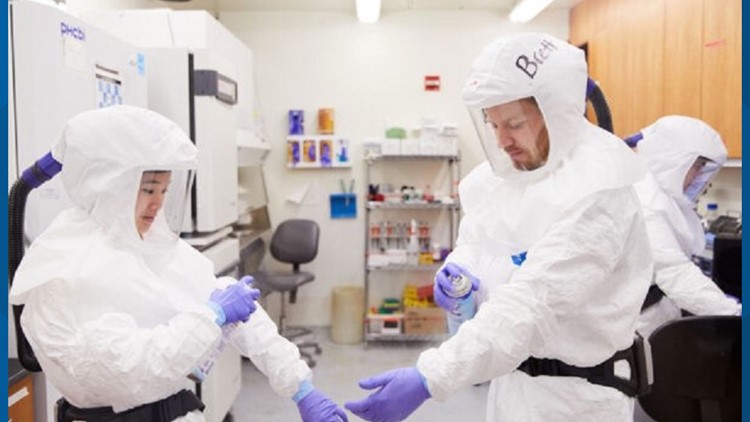ST. LOUIS — There may be new and effective ways to fight COVID-19 variants, according to findings from Washington University School of Medicine in St. Louis.
COVID-19 therapies made from antibodies are often given to patients who are at high risk of severe illness and hospitalization, WashU said in a news release. But there have been questions about whether those antibody therapies retain their effectiveness as new COVID-19 variants emerge.
New research at WashU suggests many, but not all, therapies made from combinations of two antibodies are effective against a wide range of variants. Combination therapies also appear to prevent the emergence of drug resistance.
In the study, researchers used mice and hamsters to test all single and combination antibody-based therapies against a panel of emerging COVID-19 variants from across the world. The therapies used were either authorized for emergency use by the FDA or are being evaluated in late-stage clinical trials, the release stated.
The findings suggest COVID-19 drugs made of two antibodies often retain potency as a therapy against variants even when in vitro studies indicate one of the two antibodies has lost some or all ability to neutralize the variant.
“We knew how these antibodies were behaving in vitro, but we don’t give people drugs based solely on cell culture data,” said senior author Michael S. Diamond, MD, PhD, the Herbert S. Gasser Professor of Medicine. “When we looked in animals, there were some surprises. Some of the combinations performed better than we thought they would, based on in vitro data. And there was no drug resistance to combinations whatsoever, across all of the different variants. We’re going to have to continue to monitor the effectiveness of antibody therapy as more variants arise, but combination therapy is likely needed for treating infections with this virus as more variants emerge.”
RELATED: Does COVID lead to lasting antibody protection? Answer lies in bone marrow, WashU study finds
WashU said so-called monoclonal antibodies mimic those generated by the body to fight off the virus that causes COVID-19. Administration of the antibody therapies bypasses the body’s slower and less effective process of making its own antibodies.
Researchers tested antibodies against a panel of virus variants containing key mutations in their spike genes. The SARS-CoV-2 virus uses spike protein to invade cells. WashU said monoclonal antibody-based COVID-19 therapies work by interfering with the interaction between spike protein and cells.
The panel included mutations found in three of the four variants that have been designated “variants of concern” by the World Health Organization. Those include Alpha, first identified in the UK; Beta, identified in South Africa and Gamma, identified in Brazil. Researchers also tested an emerging variant from India that is similar to the Delta variant and variants from New York and California.
Researchers used a mix of virus samples originally obtained from people with COVID-19 and laboratory strains genetically engineered to contain key mutations, the release stated.
They evaluated antibodies in hamsters and two strains of mice. They first gave animals antibodies a day before infecting them with one of the virus variants. Researchers monitored the animals’ weight for six days then measured the amount of virus in their noses, lungs and other parts of the body.
Some single antibodies showed reduced or no ability to neutralize virus variants in a dish. But low doses of most of the antibody combinations protected against disease caused by many of the variants. Researchers sequenced viral samples from the animals and found no evidence of drug resistance in viruses from any of the animals that were treated with combination therapies.
“Dual therapy seemed to prevent the emergence of resistant viruses,” said co-author Jacco Boon, PhD, an associate professor of medicine, molecular microbiology and pathology & immunology. “Resistance arose with some of the monotherapies, but never with combination therapy.”



